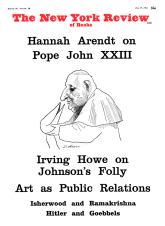In response to:
Raymond Aron and the Liberal Tradition from the May 20, 1965 issue
To the Editors:
George Lichtheim is to be commended for his comprehensive review of Raymond Aron’s Sociologists of the Revolution of 1848 (Montesquieu-Comte-Marx-Tocqueville). It is a pity, therefore, that he gives the impression that M. Aron erred in attributing to Marx some articles by Engels written for the New York Tribune. The fact is Marx, who was assigned to write them, asked Engels to prepare them for him since his English at the time was faulty. To attribute the articles to Engels, under the circumstances, is like making a presidential ghost-writer responsible for a President’s speeches.
On a more serious level, Mr. Lichtheim would seem to be out of his depths—perhaps because he knows the European scene so much better than the American—when he dismisses the influence of Montesquieu as “an important forerunner of modern sociology.” While Montesquieu may not be a significant “forerunner” of modern sociology, he was indeed a very important influence in helping to shape the minds of men engaged in making the American Revolution. In so far as this is the only Revolution that has survived where all others have failed their original intentions, it can easily be argued that even here Montesquieu’s significance for the sociology of the day is not too well understood by his critics.
Max Geltman
New York City
George Lichtheim replies:
1) If Mr. Geltman will consult the standard editions of the Works, he will find (as M. Aron could have found) that the articles in question—on the German events of 1848-49—were wholly written (not merely “prepared”) by Engels, and that moreover they represent a distinctive viewpoint. On other occasions, Marx made use of Engels’s drafts. On this occasion the whole series (later published in book-form) was written by Engels. By now this is (or ought to be) common knowledge.
2) Mr. Geltman’s notions about American history are his private affair. I was dealing with Montesquieu and his standing as a sociologist, not with the respective fortunes of American and French liberalism.
This Issue
June 17, 1965



